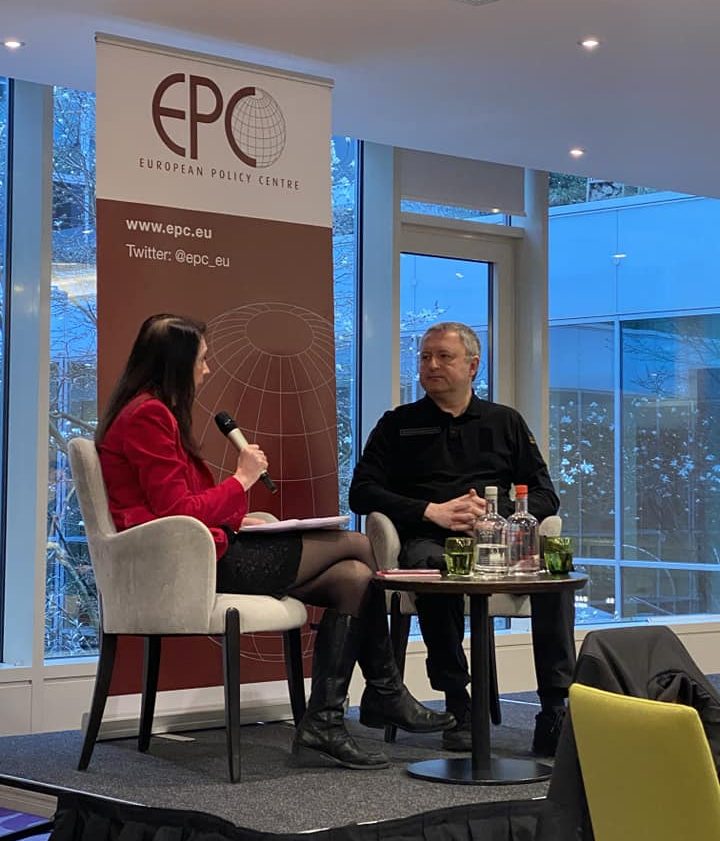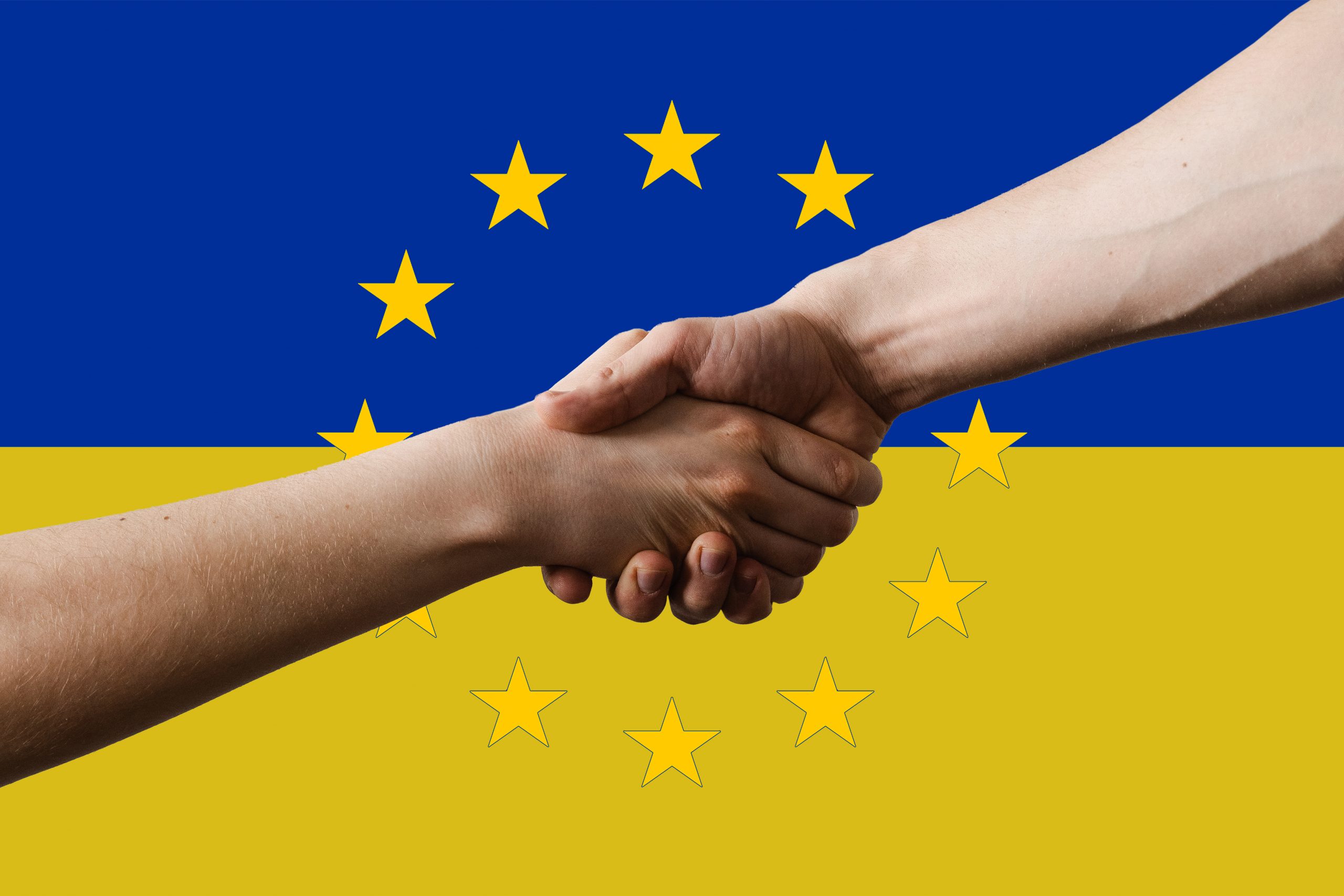Ukraine is plunged into another crisis after the Constitutional Court declared unconstitutional provisions on anti-corruption efforts among which is criminal liability for inaccurate declaration of assets. The court also deprived the National Agency on Corruption Prevention of some of its controlling functions. This decision caused sharp criticism from the European Commission, G7 Ambassadors, and a group of leading MEPs. Ukrainian President Volodymyr Zelensky said that the most liberal way to resolve the crisis would be resignation of all judges of the Constitutional Court. He does not rule out the dissolution of the Verkhovna Rada if there is insufficient support among deputies for this step. Promote Ukraine asked several Ukrainian parliamentarians and experts, how, in their opinion, can Zelensky’s and the Servant of the People’s election promises to fight corruption be combined with a decision on the activities of anti-corruption bodies and the anti-corruption crisis in Ukraine in general.

PhotoXPress
Oleksiy Goncharenko, Member of Parliament, European Solidarity Faction:
During the one-and-a-half-year presidency, Zelensky did not fulfil any campaign promises, fight against corruption among them. We see an example with the corrupt members of the presidential faction “Servant of the People,” who improve their financial situation by initiating amendments to legislation. Even the demonstratively detained deputy Oleksandr Yurchenko calmly came out of the pre-trial detention center on bail and managed to get rid of the electronic bracelet. In addition, it is worth mentioning the pressure and desire to subjugate the anti-corruption bodies, which led to a reaction from the EU, as was the case with the election of the head of the SAP (Specialised Anticorruption Procuracy). Or the fact that NABU (National Anticorruption Bureau of Ukraine) is still headed by the officially recognised kleptocrat Artem Sytnyk, who is beneficial to Zelensky. There is a desire to appoint useful personalities in these positions rather than a healthy desire to resolve the constitutional crisis. The fire is not quenched with gasoline, and Zelensky keeps playing with fire and jeopardises Ukraine’s Euro-Atlantic integration.

The photo was taken from Slovo i Dilo
Andriy Osadchuk, Member of Parliament, Holos (Voice) Faction, First Deputy Chairman of the Verkhovna Rada Committee on Law Enforcement:
Volodymyr Zelensky was and is remaining an actor. If we analyse his election promises and the current state of affairs, we see that, in fact, he has promised nothing as a politician or statesman. His campaign had simple emotional messages aimed at the general public. In the fight against corruption, everything came down to the slogan “spring will come, and we will put (corrupt people – ed.) in prison.” But the fight against corruption is not about jailing. The fight against corruption is primarily about developing anti-corruption infrastructure, practices, procedures and prevention tools. Even the relevant law is called “On Prevention of Corruption” and not “On Combating Corruption,” and imprisonment is the last part of this story. Because corruption is a consequence and you have to fight against the causes. And only specialised state institutions can do this; together they form the so-called anti-corruption infrastructure.
Therefore, one should not be surprised that Zelensky’s desire to “jail” is not being fulfilled. After all, imprisoning is only possible as a result of the actions of law enforcement agencies and anti-corruption institutions. Instead, for a year and a half of Zelensky’s presidency, there was an open fight by his entourage against the anti-corruption institutions; there were attempts to seize control over them and the maximum number of law enforcement agencies. In fact, only Arsen Avakov kept the Ministry of Internal Affairs, and all other law enforcement agencies fell under pressure from Zelensky’s monopoly on power.
The State Bureau of Investigation has been without a legitimate head for almost a year, and there is a scandal between its deputies. There is a similar sad story with the Specialised Anti-Corruption Prosecution Office. We see constant attacks on the National Anti-Corruption Bureau (NABU), starting from the case when Artem Sytnyk was caught allegedly violating anti-corruption legislation, and ending with the decisions of the Constitutional Court, both on Sytnyk and on the unconstitutionality of the President’s authority to appoint the NABU head.
Therefore, the decision of the Constitutional Court on Declarations and National Agency on Corruption Prevention was also expected. This decision plunged Ukraine into a deep constitutional crisis. This is a logical continuation of the managerial chaos that we have seen for a year and a half of Zelensky’s presidency. And the way out of the constitutional crisis, which Zelensky proposed, is the worst option for the constitutional order in the state. And this plan is also the most cynical one. After all, if the President wants to demonstrate determination, he had to disperse the Constitutional Court by presidential decree, recall the Constitutional Court judges appointed on the basis of the President’s quota, invalidate the decrees, or amend them. These options are also, mildly speaking, not very legal, but the president would take personal responsibility. Last week, he was trying to get Parliament to do absolutely unacceptable anti-constitutional work to disperse the Constitutional Court. Everyone understood this step perfectly well; its aim was that Zelensky and his entourage could have two-thirds of the court – 12 people according to the quota of the president and his party.
Zelensky proposed to fight the constitutional crisis unconstitutionally, shifting responsibility from himself to the Verkhovna Rada. Obviously, he aims to expand power, and that contradicts the fight against corruption. Moreover, one should take into account Leonid Kravchuk’s recent statement about the possibility of holding elections on 31 March 2021 in Donbas and the amnesty being discussed by the authorities. Clearly, such initiatives provoke resistance from a large part of society and politicians, and even if they are passed through the Verkhovna Rada, the only option to counteract this is to appeal to the Constitutional Court. However, if Zelensky had dismissed or taken control of the Constitutional Court, this option would no longer exist. It is also telling that the hysteria around the constitutional crisis was fueled by statements about “Russian influence” made at a meeting of the National Security and Defence Council, but no proof of this influence was provided.
I am convinced that overcoming the constitutional crisis and restoring the anti-corruption infrastructure are two issues that must be considered separately. However, unfortunately, on Thursday the Verkhovna Rada was unable to vote in the first reading of the so-called “Razumkov’s law,” which returns the norms of anti-corruption legislation to the Ukrainian legislation, which were repealed by the Constitutional Court. This decision is also far from perfect, but from a political point of view, it is probably right.
We will see how the events will develop this week. But I think we should not expect good news from Ukraine on the development of anti-corruption infrastructure and the renewal of trust in it. The same goes for President Zelensky as a fighter against corruption.

The photo was taken from rudenko.kiev.ua
Maria Mezentseva, Member of Parliament, Servant of the People (Sluha Narodu) Faction:
I believe that the President has to give what is due in his rapid response to the events that unfolded in the Constitutional Court. As we already know, in relation to the threat to our national security, in particular with the recognition of the anti-corruption legislation as being unconstitutional, the President called for an urgent meeting of the National Security and Defence Council.
We have to understand that it is impossible to review, cancel or appeal the decision of the Constitutional Court, as there is no legislation that would allow us to do so. To change the situation and resume the functioning of the National Agency on Corruption Prevention (NACP), the President or the Parliament need to introduce changes to the existing law on anti-corruption, taking into account the comments of the Constitutional Court.
It is important to note that the President has already introduced draft law №4288 “On the restoration of public confidence in the constitutional judiciary.” This Bill is composed of three articles. The President also said that in the second reading of his Bill, deputies may introduce necessary changes.
My colleagues and I started having discussions on the issue, and we saw another registered Bill whose author was Mr. Dmytro Razumkov. This Bill offers the same political-legal solution as offered by the President, but on a much smaller scale with different consequences. Although in the current situation there are few actual solutions, we have to act professionally and coordinated as civil society is currently experiencing certain tensions, which we, as members of Parliament, need to reduce. Citizens expect simple solutions to complex problems from us. Undeniably, the President made his contribution in solving the current constitutional problem.
The current situation was a result of an appeal brought to the Constitutional Court on 4 August 2020 by 47 members of Parliament from the ‘Opposition Party – For Life’ and ‘For the Future’ political fractions. They asked to declare unconstitutional the mandate of the NACP and its demand to provide information on family members; two articles of the Criminal Code – on the illegal enrichment and on the entering of inaccurate information on the declaration.
The Constitutional Court started looking at the appeal on 8 October 2020, and, on 19 October, unexpectedly continued the consideration of this appeal in written form. At the meeting when this decision was accepted, neither the representative of the Vekhovna Rada, Olha Sovhyrya, nor the representative of the President, Fedir Venislavskyi, were admitted to partake.
Important to note is that the appeal has only been considered since 8 October 2020, and to attribute such little time to such an important question without the proper clarification of the positions of the participants, and taking into account that similar appeals have taken more than five years to look at, this indicates the involvement of certain interests in this particular case.
Obviously this does not mean that trust in the Constitutional Court as an independent organ is lost. However, it does evoke outrage and the loss of trust in the institution’s authorities. It was not easy to pass the anti-corruption reform and under no circumstances should we doubt its necessity and importance.
The Constitutional Court published the adopted decision on 27 October, declaring unconstitutional a certain number of laws that made up the anti-corruption platform.
I want to mention that, previously, the permanent representatives of the Verkhovna Rada and the representatives of the President made certain statements in the Constitutional Court about the dismissal of judges, as well as requesting an oral hearing to clarify the position of participants, however, in this case, all of these requests were denied.
Right now we have to deal with the consequences of the decision made by the Constitutional Court. In recognising that the Constitutional Court can no longer continue to work in such capacity, my colleagues and I appealed to the judges of the Court who voted for Bill № 13-r/2020 to immediately seize their abuse of power.
Among my colleagues, there are constitutionalists with whom we registered the Bill “On the Amendments to the Law of Ukraine ‘On the Constitutional Court of Ukraine,’” which includes the following:
- The processes of the Constitutional Court of Ukraine are determined by the law.
- We increase the number of judges’ votes needed to adopt laws from 10 to 12 in the Grand Chamber (Upper House), and up to six in the Senate. We understand the risks, but at this moment in time, we believe that this is the only possible way out of this crisis.
On 6 November, we initiated the selection process of new candidates for the position of Constitutional Court judges, and soon we will have a partially renewed composition of the Court.
I hope that if the new Constitutional Court were to reconsider its initial decision or if the constitutional mechanism restores itself through the adoption of decision by the Verkhovna Rada, as opposed to re-inventing the declaration system, then this would be a full-fledged solution to the problem.
To avoid similar scandals in the future, the reformation of the Constitutional Court would greatly help.

The photo was taken from golos.com.ua
Sofia Fedyna, Associate Professor of Ivan Franko National University of Lviv, Member of Parliament, Faction of the political party “European Solidarity”:
It so happened that from the first days of Zelensky’s presidency, especially after the 2019 parliamentary elections, President Zelensky received essentially all the power, because having his own parliament, his own majority, and his own government, he appointed all his ministers, as well as law enforcement agencies – I mean the Prosecutor General’s Office of Ukraine, the State Bureau of Investigation, the Security Service of Ukraine and also partly the Ministry of Internal Affairs, because it is still led by his minister, he had every opportunity to actively take up the fight against corruption. But it seems that it was not in his interests, and he was using all the tools to deal with the opposition and take revenge on President Poroshenko. Honestly, I don’t understand why Zelensky is personally offended by him. But we have a situation where even before the constitutional crisis, the Constitutional Court illegally repealed anti-corruption legislation. We had a large number of announced cases of corruption among the deputies of the “Servants of the People” in the Verkhovna Rada of Ukraine. If you look to see if those cases have been initiated, in fact, no suspicions have been declared, nor have those cases received any movement. Instead, the cases against me for the words of truth, against Poroshenko for the defence of Ukraine, against Vyatrovych from the Ukrainian Institute of National Remembrance for organisation “Memorial to Holodomor victims,” against Tetyana Chornovil for the Maidan, against Parubiy and Turchynov for participation in the Revolution of Dignity – all these cases were actively moving forward. As for now, I doubt that all this happened without the knowledge of President Zelensky. Various sources say that all this was known about the decision of the Constitutional Court before the election, but the decision was delayed so as not to damage the ratings of the Servants of the People Party in the election. It is interesting to note that Zelensky reacted to this decision of the Constitutional Court only after our foreign partners were outraged, after all, as we, as the opposition, started to raise noise around this issue and about what is threatening us with the loss of visa-free travel, the loss of support for our Western partners. I am sure that there could be the influence of Bankova on the Constitutional Court because we have repeatedly heard Zelensky was simply ordering law enforcement agencies to do certain things, regardless of whether it is within their level of competence or not. The situation is also strange given that judges could repeal this anti-corruption legislation only in the part that concerns judges. Instead, they repealed absolutely all anti-corruption legislation in full. It is also an interesting situation that in order to have levers of influence in the Constitutional Court, so to speak, approximate levers of influence, the majority could have long ago appointed its judges, more precisely, according to the quota, which is now free. As it turned out, the competitions were held about six months ago, but so far for some reason this issue has not been submitted to the hall. Another interesting situation concerns the fact that President Zelensky is submitting a completely unconstitutional bill to solve the so-called anti-corruption crisis, which many have regarded as a usurpation of power. And he is pressuring parliament, threatening his faction with essentially dispersal that parliament should pass an unconstitutional law. It is worth noting that the parliament began to look for another way, not wanting to take responsibility for unconstitutional, illegal actions. And here we must note two possible steps: this is Razumkov’s bill on the return of anti-corruption legislation, which may not be 100% ideal legally, but the whole parliament has united around this bill. And the second is the public appeal of deputies of different factions to the judges of the Constitutional Court, who, in fact, destroyed the anti-corruption legislation, to simply resign voluntarily. Of course, this is a non-binding appeal, but at least it was also a consolidated position, which showed that the Servants and Razumkov didn’t want to act illegally, as proposed by President Zelensky. But, instead of promptly adopting Razumkov’s bill, we received a blockade of this bill by Dubinsky’s alternative bill, which is associated with a specific oligarch. For now, all this has been postponed for two weeks, and let’s see how it will develop further, but today there is information that they will try to push Razumkov’s bill to return anti-corruption legislation at the same time as Zelensky’s unconstitutional bill on dissolution, full dissolution of the Constitutional Court. As far as I understand, today we have another call from our foreign partners that we must very clearly adhere to our commitments to the European Union, and, in fact, it is in Ukraine’s interests to return to the legitimate course as soon as possible, in particular, the fight against corruption, declarations, coverage of declarations, and liability for false declaration. But I will say more that this decision of the Constitutional Court on the one hand closed a large number of criminal cases against those who dishonestly declared. And in these cases, the longer the consideration of the bill on the return of anti-corruption legislation, the more cases are closed. The second point is that, given the abolition of anti-corruption legislation, newly elected chairmen of united territorial communities, chairmen of district councils, and heads of local self-government bodies cannot be appointed. And the third point is that it seems that someone from the outside really wants to sow constitutional chaos, which is added to the economic crisis, to the budget crisis, to the military crisis, to the coronavirus crisis. And this is just a game of total imbalance and ensuring the unsustainability of the Ukrainian state.

The photo was taken from uba.ua
Ivan Horodyskyy, a lawyer, managing partner of Dexis Partners Law Firm, founding director of the School of Law of the Ukrainian Catholic University:
The situation around the Constitutional Court of Ukraine (the CCU) seems to be a part of the planned scenario. The decisions of the CCU of 27 October 2020, as well as previous ones that devalue the success of anti-corruption reform, look like part of a consistent course of events. But the President’s initiative to resolve the issue by the “dissolution of the Constitutional Court” is even worse as it could lead to a more profound constitutional crisis than in 2014, challenging the legitimacy of all supreme authorities in Ukraine.
Defending the CCU, in this case, many lawyers and experts uphold it as an institution but not its current trial bench. The solution of the problem with current composition in a suggested way is not systematic, and the reform of the CCU and change of its composition should be performed in terms of the Constitution of Ukraine and the Law “On the Constitutional Court of Ukraine.” The case of suspicions in dishonesty of current judges and independence of their decisions should be the competence of law enforcement authorities.
The key to the solution lies in changing the approaches to the formation of the personal composition of judges of the CCU. It is obvious that the current existing model of appointment of 18 judges for the term of 9 years without the right to be re-elected is ineffective. Unfortunately, in Ukraine there is a lack of highly qualified specialists with a deep understanding of constitutional law. The latter complicates their turnover within such a short period of time. One might consider reducing the number of judges and extending their term of office.
But even in this case, it is important to reduce the political component in the selection process. One should eliminate the quota principle of nomination of judges in the Verkhovna Rada as well as the backstage appointments by the Congress of judges and by the President. Only a transparent election of judges, which ensures their high level of professionalism and integrity, can guarantee their independence and public confidence in their decisions.
After all, the current crisis was caused not only by the content of the decision itself, but also by the low quality of argumentation and justification and, moreover, by the public distrust in the CCU as an independent institution, as in recent years the decisions of the Court very often reflected the interests of certain political elites – interests that often run counter to the public interest.
Natalia Richardson
Translated by Natalia Richardson, Artem Kyzym, Evhenia Kolomiets-Ludwig, and Ivanna Malchevska






 UA
UA FR
FR DE
DE



